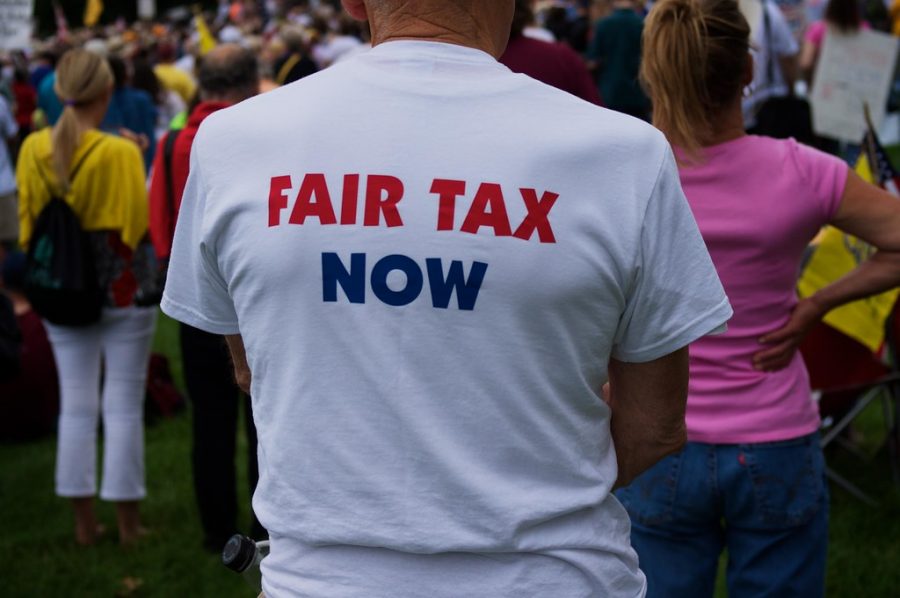How Fair Was the Wording in the Fair Tax Amendment?
The 2020 Illinois ballot introduced a new initiative called the Illinois Graduated Tax Amendment, also referred to as the Fair Tax Amendment, a reform that would change Illinois’ flat tax (in which everyone pays state income tax at the same rate, currently 4.95%) to a tax system in which the state could set income tax rates at different rates for different taxpayers. But, many of this initiative’s possible outcomes were camouflaged behind misleading and potentially unethical phrasing designed to manipulate voters. The amendment, led by Governor J.B. Pritzker, lost 54.54% to 45.46% statewide, even though 70% of Cook County voted in favor of the proposal.
Upper School AP Statistics teacher Tim Kendrick describes the scenario in which misleading wording may influence decision-making as a form of “response bias.” In the case of the Fair Tax Amendment, the charge is that the specific language of the amendment may have been misleading in a manner that unfairly helped the ballot measure, although admittedly it didn’t help enough to make the amendment a success.
To start, many proponents of the Graduated Income Tax Amendment refer to it as the “Fair Tax Amendment,” an example of subjective phrasing leading to response bias. “That [name] is already providing leading information to try and suggest that taxes right now are not fair, so that would consistently overestimate support for that ballot,” Mr. Kendrick said.
Second, the wording of the amendment is arguably quite misleading. “The proposed amendment grants the State authority to impose higher income tax rates on higher income levels, which is how the federal government and a majority of other states do it.” This wording fails to mention that the amendment simply gives the Illinois State Legislature the right to set different tax rates for different people.
A better worded amendment would not suggest that the proposed tax policy would have automatically led to a progressive tax system in which people with higher levels of income are taxed at a higher rate than people with lower levels of income. The state could theoretically have used their new freedom to increase taxes on lower income individuals and decrease them on higher income individuals. The wording used presents only one possible outcome, leading people in support of a progressive tax system to vote in favor of it.
Mr. Kendrick explained the confusing language as “something that can be interpreted as, ‘Oh, I’m gonna pay less state income tax,’ and that’s not necessarily what this language means.”
Mr. Kendrick also disagreed with the amendment’s use of examples from other states (and the U.S. itself). “Saying that this amendment is how the federal government and a majority of other states do it is not relevant to someone’s opinion about whether this should happen in the state you live in,” he said. “To make the comparison to the federal government and other states is terrible wording.”
Moreover, even if the amendment was only ever used to tax lower income families less, it would be difficult for the amendment to have been effective. Other states in which the state legislature holds the power to decide income taxes, such as New York and California, have income taxes ranging from 4% to 8.82% and 7.25% to 12.3%, respectively. As a result, high income individuals are incentivized to leave and move to states like Texas and Florida that have no state income taxes. If Illinois becomes the next state to raise taxes and as a result, people leave, the lower and middle classes would bear the burden of those taxes.
“I voted against it because I thought that it didn’t really solve the problems that Illinois is facing with their budget deficit,” said senior and first-time voter Henry Coleman. “I thought it gave the Illinois State Legislature too much power to continue changing the tax rates for Illinois citizens.”
The fact that this initiative lost by a 10-point margin with faulty wording makes one wonder what the margin would have been if the wording had been more fair. In a state where Joe Biden won 57.2% of the vote, these results prove that taking a side on this issue is less of a reflection of where a voter stands on the political spectrum, and more of an expression of the voter’s view of good governance.
Misleading phrasing on a ballot is unethical, as it may give the government powers to enact scenarios that were not initially illustrated in the amendment. Amendments should be straightforward in their wording so that voters can make decisions for themselves––rather than let the framers of the amendment make decisions for them. It is important that everyone researches what they are voting for, as taking an amendment at face value does not count as an informed decision.

Ashna has been writing for The Forum since freshman year, and it remains one of her favorite activities. She also enjoys working out, making...
























































